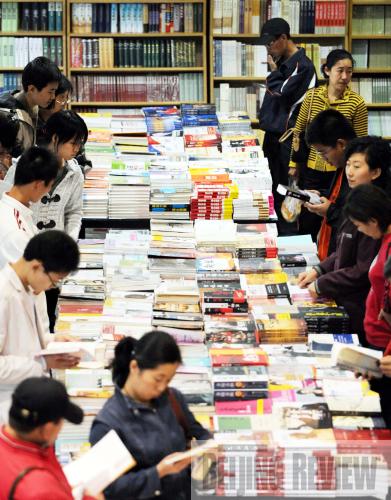|
 |
|
JUST BROWSING: Most bookstore visitors come to read, not buy (WANG JIANWEI) |
Small Screen Scam Shopping
Recently, the Beijing Consumers' Association issued a survey report, exposing six major flaws in TV shopping. One of the most obvious that emerged was that so-called "gold" jewelry articles were actually made of cheap metallic knock-offs. TV shopping was introduced to China in 1992. The total business volume of this form of buying reached 15.6 billion yuan ($2.23 billion) last year. However, the convenient shopping method has also resulted in a series of problems: poor quality and after-sales services, false and exaggerated ads, fake brands, etc.
The idea of TV shopping is not a bad thing. The chaos in the industry is a result of ineffective management. Though only 10 TV channels in China have regulatory approval to broadcast shopping programs, in reality hundreds of TV channels have jumped on the bandwagon. Worse still, more than 90 percent of the companies engaged in TV shopping are unlicensed. Even after fraud cases were exposed, the businesses involved were not severely punished, giving them carte blanche to continue their illegal operations. Some TV broadcasters are only interested in money, and give up the responsibility to examine product quality. The payment and settlement procedures are also problematic, as the seller will deliver goods only after the payment has been deposited in their bank accounts and there are no restrictions on their rejection of buyers' refund demands.
To make TV shopping a healthy business, it is necessary to implement strict regulatory measures, together with stiff punishment. Even more important is to ensure businesses in this industry uphold the spirit of fair trade.
Xinmin Evening News
Price Hikes Seldom Revert
The Ministry of Industry and Information Technology recently said that charges on third-generation mobile services could be reduced from the present level, but this would take some time to implement because a pilot program for this purpose has to first be conducted. We are wondering how much will be cut and how long we have to wait before these cuts take effect.
The public has long been complaining about the excessively high charges on cellphone users for long-distance and roaming calls. As for the so-called cost cut trials, they reportedly have been conducted in three cities in central Hunan Province, where long-distance service charges have been abolished. Aren't these trials enough for further charge reduction across the country?
As we know, there are neither roaming nor domestic long-distance service charges in the United States. In Japan, although there are roaming service charges, they are usually part of a service package, so the cost is limited.
Industry experts have pointed out that roaming is an almost costless process of delivering simple information generated by computers between two places. Why then do we need to pay such high roaming service charges?
Behind the high charges on long-distance and roaming services lurks the evil head of a monopoly. The situation here is similar to that of refined oil pricing. While price hikes can happen at the whim of the monopoly, you can be sure price reductions won't happen that easily.
Yangcheng Evening News
Can Money Buy Quality?
In a bid to attract better students, Zhejiang Normal University in eastern Zhejiang Province has announced its latest recruitment incentives. The university pledged that all signed-up candidates who are among the province's top 100 best-scoring students in this year's college entrance examination will each receive 200,000 yuan ($30,000) in scholarship. The belief is that the best students will boost the school's recognition among the public.
However, the reality is money cannot buy everything. While 200,000 yuan is indeed a big sum, it is not necessarily enough to attract high-caliber high school graduates. For most students and their parents, what is important is not the immediate benefit, but a bright future. What they value is the reputation and competitiveness of a school, such as the academic atmosphere and quality of teachers.
To raise a university's competitiveness, excellent students are only one thing, while good teachers, sound overall environment and a well-devised curriculum are equally important. If a university is short of these basic qualities, even if it can offer huge scholarship funds to lure students, the results will be disappointing. In this case, Zhejiang Normal University should focus more on how to improve its overall education quality rather than on "buying" these young people.
Beijing Times
Online Challenge
The three-year-long price war between the Disanji Bookstore in northwest Beijing and neighboring Zhongguancun Bookstore has ended with the former losing 46 million yuan ($6.6 million) and finally closing down.
Operating a physical bookstore is expensive, with overhead such as warehouses, equipment and staff all adding to the bill. Nowadays, with readers turning increasingly to the Internet for reading, few people are optimistic about the future of physical bookstores. Online bookstores sell books at discounts of 40 to 50 percent, meaning physical bookstores are under the gun. Recognizing this, many booksellers choose to transform themselves into online operations.
Although physical bookstores are never short of visitors, the fact is, most of these are browsers rather than buyers. When digital publishing and reading becomes mainstream, the big question is how will physical bookstores cope with the challenge posed by their online counterparts?
Shenzhen Economic Daily | 